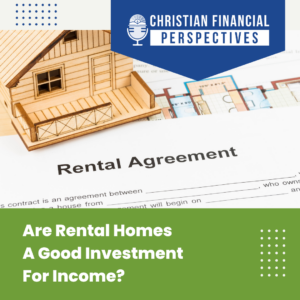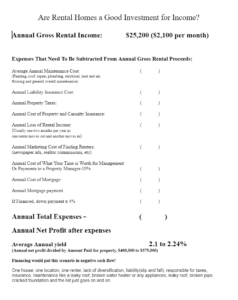Click below to listen to Episode 129 – Are Rental Homes A Good Investment For Income
Subscribe: Apple Podcasts | Google Podcasts | Spotify | Amazon Music | Stitcher | RSS | More
Are Rental Homes A Good Investment For Income

Find out why rental homes as an income investment may not be all that its chalked up to be.

Having a rental home may seem like an easy way to create a secondary income source, but you might just be surprised at the minimal dollars you’ll take home after all is said and done. Bob and Shawn go into the not-so-glorious side of having a rental home as an income source. Many renters don’t consider all of the work, time, and money that goes into being a landlord. This includes repairs, insurance payments, taxes, and just general wear and tear on a rental house. The takeaway? A rental home as investment income may not be worth the hassle because of the minimal amount of finances you may earn from it and the huge amount of money you’ll probably be pouring in.
HOSTED BY: Bob Barber, CWS®, CKA®
CO-HOST: Shawn Peters
Mentioned In This Episode
Want to ask a question about your specific situation? Schedule a complimentary 15 minute phone call.
EPISODE TRANSCRIPT
[INTRODUCTION]
Welcome to “Christian Financial Perspectives”, where you’re invited to gain insight, wisdom and knowledge about how Christians integrate their faith, life and finances with a Biblical Worldview. Here’s your host Christian Investment Advisor, Financial Planner, and Coach, Bob Barber.
[EPISODE]
Shawn:
Welcome to another episode of Christian Financial Perspectives. As always, thank you so much for joining us, whether that’s on video or listening to us on all the wonderful podcast directories.
Bob:
And you need to tell everybody we prayed for the Lord’s protection today, from realtors.
Shawn:
From the realtor mafia that.
Bob:
We love realtors. They’re great people. I got some good friends that are realtors. We rent to a real estate firm here in our office, so we’re just playing. But today is gonna be “Are Rental Homes A Good Investment For Income?” What’s the conclusion? You wanna tell everybody. The short answer is no, but we’re gonna tell you why today because I’m always getting this question, Shawn. I bet I get this question nearly once a week from someone that says, Should I take my money out of a moderate balanced portfolio and go buy a rental home? Cause we’re looking at some rental homes for income.
Shawn:
And what’s that one thing that people always lead with, too, is they say, Well man, in this area I could rent it out for $2,500 a month or $2000 a month. And they’re looking at what they have on their home, because maybe they already have a home in the area. But they’ve had it for a while and they’re paying $900 a month, so they’re doing the math like, well that’s pretty good. It’s like, Okay, but hold on.
Bob:
Yeah, it computes, if you think about it. I did some research for about a $400,000 home in our area and just so all of you know, a lot of you I know are not in our area. Our area is between Austin and San Antonio, and I know it is a pretty hot real estate area, but a home that will rent for about $2000 a month and actually we’re gonna use…
Shawn:
Maybe $2100.
Bob:
That’s the actual example because I went and looked online and what the homes and just in a certain area were renting for per month, and it was an average of $2100 and the average sales price was $4,000. I mean, $400,000.
Shawn:
Gotcha.
Bob:
Not $4,000. $400,000.
Shawn:
So an average of $400,000 rental home and an average of about $2100 per month for the gross rental income.
Bob:
So it sounds good, right. Because you got $25,000 that you could make on $400,000 a year. Multiply the that out. I mean, that’s more than a 6% return. It looks pretty good.
Shawn:
The initial start, that looks pretty good. But what are the things that you’re gonna hit us with that we need to be aware of that you gotta start deducting those from that gross income.
Bob:
All right. So, so I asked Garrett, who helps us with our recording, to put up on the screen here a worksheet, and if you want a copy of this worksheet, give us a call.
Shawn:
Actually, we’ll just put a link to it. We’ll put a link in.
Bob:
Can we do that?
Shawn:
Yeah. We’ll put a link in the description and if you’re watching us on our website directly, it’ll be on the page.
Bob:
Okay. So this is a really good reason why our podcast listeners need to watch the video. By the way, like us on on YouTube. We need likes.
Shawn:
And subscribe. All the good things. Comment.
Bob:
All the good things. All right. So what we did was I took the annual gross revenue, and this is in our own town, but I think it’s very typical of the central Texas region as well. $25,200. So, that’s your gross per year. But then you need to subtract from that and that’s what’s going to get our yield actually below 3%. So the expenses that need to be subtracted. For one, you gotta think about average maintenance costs on an annual basis. And I put $2,500 in here. As you know, I’m taking about 10% of the rent. Now, that may not happen every single year, but when you have that deductible on a roof, because we have a hail storm come through.
Shawn:
Which for us, when we were at the time recording this, it was earlier this year. There’s a hail storm this year and there’s a lot of people…
Bob:
There’s a lot of hailstorm in the springtime in this area. Another thing would be a lot of air conditioners were breaking this summer because we had such a hot summer.
Shawn:
Well that reminds me, too, of like painting that sometimes you have to repaint. I know even for this building that we have here that our office building, we had to repaint and you know, obviously for a larger office building, it’s gonna be a little more expensive than the average rental home, but that can get expensive.
Bob:
It can. So, so why you may not have that $2,500 every year, you think of it. Well, every four years there may be a $10,000 event. Or every three years there may be a $7,500 event.
Shawn:
Kinda budgeting for that. You may not have seen that come out of the checking account this year. But it’s more of, you need to earmark that each year to make sure that when something comes up, whether it’s four years or six years or whatever it is, that you have it available and you’re not gonna hold the bag.
Bob:
And that’s gonna directly affect your yield because that’s coming off of the $25,200 per year. So you have to subtract that. A second thing I have in there, I think that is smart for everyone to have, is they need liability coverage. They need to have an umbrella policy that goes over that. Not only that, I believe it’s very important if you own rental homes, that you need to have each rental home in a limited partnership. Not one limited partnership that owns multi – that owns a lot of homes. But each individual home needs to be an individual limited partnership. The reason I say that is because if there were to be a slip and fall or somebody were to hurt themselves, they can’t get ahold of – if you had three rental homes, they couldn’t get ahold of ’em. Three of them. So, it’s very important that you break that liability up per home. Alright. So I’ve got an average cost in there of just a couple hundred dollars. I think that’s very, very reasonable. Here’s the big one, especially in Texas, and I think a lot of Californians that are moving here are being surprised. They don’t realize that our property taxes are so high here. We may not have an income tax in the state of Texas, but they make it up on the property taxes. So, you gotta figure about $2, right at $2 per, I think it’s per thousand. So it computes out here on a $400,000 house at around $7,500 to $8,000 per year. that comes directly outta that $25,200 again.
Shawn:
Right. Because try not paying your property taxes and see how long you keep that rental home.
Bob:
Try not paying it even on your own home.
Shawn:
And to clarify, I say don’t do that. Make sure you pay the tax.
Bob:
That’s why I say you never really own your home in Texas, I mean, or some of the other states that have…
Shawn:
You just pay off the primary loan at some point and then you’ll pay your minimum rent from the government.
Bob:
Exactly. Yeah. That’s right. So that has to come out of there. Then we have the annual cost of property and casualty insurance. I’ve verified this with a few sources. It’s gonna be about $1,800 a year. Then we have what’s called annual loss of rental income. Now somebody says, well wait a second, what if I have a year lease or a two year lease? Well, yeah, you don’t have to figure that in there, but every year or two you are going to have a renter to leave and a renter come on. And during that time, you’re gonna have to go in, maybe do some paintings, some fixing up, and you might lose as much as one to two months of rent during that time. So you’ve got to figure that into the equation.
Shawn:
Yeah. And again, that’s one of those where it’s not so much that you lost $100 that year, it’s more so of, okay, let’s say you did have a tenant who was on a 24 month lease and then they decide to move somewhere else, you know? I mean, they decide they’re gonna buy a home. Well, either way you’ve lost that tenant after that 24 months. So budgeting for that, earmarking that 2100 a month in this case, is good. So when you take two or three months to get that new tenant…
Bob:
And you may not, you may get one in a month, but still you’re gonna have a month lag time. I guarantee you’re gonna have at least a month lag time between. Usually when a tenant comes out, you gotta go in and clean up. You might wanna do a paint job, spruce it up again for the next tenant. Annual marketing costs, that’s not a lot. I put just a couple hundred dollars in there, but if a property manager were to bring you a tenant, they may charge a commission to do that. But I also have in here the cost of a property manager and I talked to a well known realtor here in town and he said about 6% to 10% a year, 10% if you just have one home. It can go down if multiple homes.
Shawn:
So if you have multiple rental properties, it could be a little less expensive.
Bob:
But then somebody might say, I’m not gonna hire property manager. I’m just gonna do it myself. Correct? You still gotta think about what your time’s worth.
Shawn:
That’s a good point. Yeah.
Bob:
You’re going to spend at least couple hours every month maybe collecting the rent, checking on the renters, especially if you have to go over and fix a dishwasher or something like that. So you’ve gotta figure that in at a couple hundred dollars a month.
Shawn:
Gotcha. So that’s total, you have that at about $2,500 per year.
Bob:
That’s correct. Now you notice on my chart here, what I did was I put an annual cost of mortgage. That’s if you were to finance it, but in this case, I don’t have financing this home at all.
Shawn:
So this is assuming your best case scenario where maybe you had cash and could buy the home outright and not not having the mortgage. So obviously, all these numbers that we’re looking at, if you also have to add in the cost of the mortgage…
Bob:
You’re gonna be negative cash flow.
Shawn:
You’re gonna be negative. Yeah.
Bob:
You’re gonna be negative cash flowing every single year. Now, remember what we’re talking about is, are rental homes a good, are they good for income?
Shawn:
Right. Are they a good investment for in generating income?
Bob:
I’m not including appreciation in this, and especially right now, because things are so overvalued. But normal appreciation on real estate if you get back to the norm…
Shawn:
Not the last couple years.
Bob:
No, the norm for the last 80 years is gonna be 3%, 4% a year.
Shawn:
Gotcha. All right.
Bob:
So, but just as far as just yield and income when you total all of this up, we’re at $16,800 that has to come away from the $25,200.
Shawn:
So we’re left with $8,400 as our net profit after expenses.
Bob:
That’s right.
Shawn:
Or the earmarked expenses?
Bob:
Right. That’s correct. Those expenses are gonna be there. All of these expenses are gonna eventually be there. This is going to be, I feel very confident about this and one of the reasons is I came from a family, a dad that was in the business for 45 years. He owned a lot of rental homes, and I never could figure it out why.
Shawn:
And you built homes too.
Bob:
Back in the ’80’s I did.
Shawn:
You’ve been involved in various aspects of that.
Bob:
So I have a family that was from the building business and real estate business. So, the bottom line is, is your yield comes out in this case scenario on a $375,000 to $400,000 home. And by the way, this area I looked in, that was the low, there were some homes that were $450,000 to $500,000. So, I’m really being conservative on these numbers. That annual yield came out to be 2.10% to 2.24%. That’s if you do not have a mortgage on the property.
Shawn:
Gotcha. And Bob, really, I guess for those watching or listening that 2.1% to 2.4%, you would be basing that on, okay, you’re gonna have this property for at least, say, four years, maybe four, maybe five years. And so it’s kind of like what that ends up averaging. So like if you were lucky and you had a tenant that you got in there real quick and you had ’em for 24 months and you didn’t have anything break, you didn’t have to repaint, there’s a lot of things that could go your way where that yield could be a little higher in the first couple years.
Bob:
It could be.
Shawn:
But if you’ve got it for four to five years, which really what you should be looking at anyways. It’s not a one to two year time period, then you’re probably gonna end up averaging in that 2.1% to 2.4% if you don’t have a mortgage .
Bob:
Now, Shawn, I look at that and I think about this and you see what I’ve got there on the bottom of my worksheet. That’s one home, one location, one renter. You’re very much lacking diversification. You have liability, you’re responsible for the taxes, insurance maintenance, like a leaky roof. You’ve got the broken water heater that happens in the middle of the night, or the broken pipe, the cracked foundation. That’s a possibility. And I’m telling you, Shawn, the list goes on and on.
Shawn:
All the fun things of home ownership.
Bob:
I cannot figure out why anybody would want to do this because you can buy a good balanced mutual fund that’s a dividend paying fund and get that in dividends and have the diversifications, and you still have the possibility of appreciation. I mean, here, I know you say there’s the yield, but a what about appreciation? You have the same thing in a good balance portfolio that’s going to yield the same thing. Why? Why would you not be?
Shawn:
But the added benefit, though, is when you’re in a balanced portfolio is that it’s a liquid investment.
Bob:
It is. That’s true. It’s very liquid. You don’t have to put it on the market. You don’t have to pay real estate commissions, you don’t have to pay all the title fees. Just to get rid of the thing, it’ll run you 7-10%. So you have to make up for all that.
Shawn:
So it sounds like the, again, as we said at the beginning, the answer to the question that is buying a rental home as an investment good for generating income. The answer is no.
Bob:
It’s not. I’m sorry to tell you, but it’s not.
Shawn:
Even in the best circumstance, it’s really not.
Bob:
Based on, and I can back this up, it’s based on history. I got the worksheet right here. Like you said, you’re gonna put a download link where they can just pop on that. Good deal.
Shawn:
So we should be able to have it on the podcast episodes as well. So if you are listening when it’s on your phone, you’re on the computer, you should be able to click on the episode and click that link from there.
Bob:
So now anytime – this phone call we get once a week. We made the one on gold, now we have this one. They’re like, what is a good investment? Okay. We’ll tell you. Thank you for listening today. If you would like good financial advice that’s based on a fiduciary
Shawn:
Advisor.
Bob:
Exactly.
Shawn:
Sorry.
Bob:
Based on fiduciary advisors where it’s about you. We’re not gonna put you in anything commission based. So, you’re the one that pays us and we don’t have any conflict of interest here.
Shawn:
Right
Bob:
Okay. So give us a call at (830) 609-6986 during business hours, or you can text that number as well during business hours, or visit us on our website at ChristianFinancialAdvisors.com.
Shawn:
Thank you again for joining us. God bless. And until next time,
[CONCLUSION]
That’s all for now.
We invite you to listen to all of our past episodes covering many financial topics from a Christian Perspective. To make sure you don’t miss any of Bob’s upcoming episodes you can subscribe to Christian Financial Perspectives on iTunes, Google Play Music, Spotify, or Stitcher. To learn more about integrating your faith with your finances, visit ciswealth.com or call 830-609-6986.
[DISCLOSURES]
Investment advisory services offered through Christian Investment Advisors Inc dba Christian Financial Advisors, a registered investment advisor registered with the SEC. Registration as an investment advisor does not imply a certain level of skill or training. Comments from today’s show are for informational purposes only and not to be considered investment advice or recommendations to buy or sell any company that may have been mentioned or discussed. The opinions expressed are solely those of the hosts, Bob Barber and Shawn Peters, and their guests. Bob and Shawn do not provide tax advice and encourage you to seek guidance from a tax professional. While Christian Financial Advisors believes the information to be accurate and reliable, we do not claim or have responsibility for its completeness, accuracy, or reliability.










